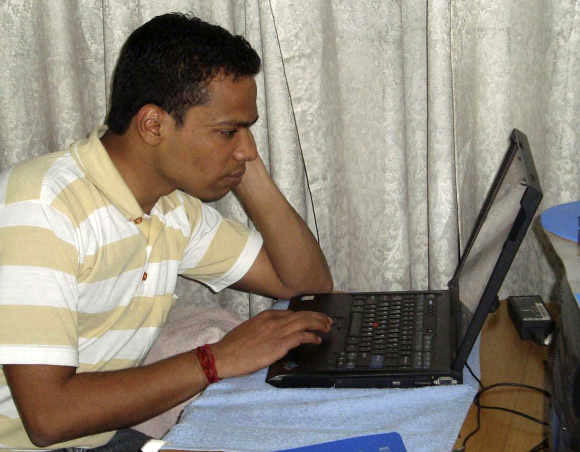 | « Back to article | Print this article |
Study Abroad: How to spot a FAKE UNIVERSITY!
In the wake of the University of Northern Virginia shutting down due to lack of accreditation, Sunit Survase, executive director, Grad-Dreams Education Consulting offers advice on how students can identify a genuine international university from a fake one.
For students who aspire to pursue their education abroad, the most important process involves selecting the right university. It is also a time consuming process.
Students should be extremely careful while selecting an institution abroad.
Getting into a good school will improve the chances of future success, in terms of knowledge, career prospects as well as getting lucrative job offers.
However, if you make a wrong choice, your career could be at stake.
Till the 90's, bad institutions or fake degree colleges around the world were limited to their respective geographical regions.
But the internet revolutionised the way the 'business of education' was done and it gave birth to those dodgy operators who moved into the virtual realm easily and swiftly!
The degrees were conferred in all educational levels till the PhD right from science to arts and business to law or even medicine!
Their major clientele were those illegal immigrants who wanted to study, work and live for a relatively lesser cost and also the students were in search of quick and easy route abroad!
Hence these fake degree and diploma mills sold bogus qualifications without any accreditation and helped thousands to apply for the student visa, which in turn enabled them to stay in that country for illegal work purposes.
In the midst of this turmoil, these shady business owners were successful in trapping even the genuine, career-oriented, vulnerable students and parents duping them for more than $ 700 million per year!
The author Sunit Survase is a study abroad consultant and can be reached at sunit@gdx.in
Dear Readers, Have you been an unsuspecting victim of a fake university scam or are you studying overseas?
Share your experiences with our readers.
Tell us your stories, share tips with young readers wanting to travel abroad for higher education.
What are the pitfalls they must avoid; what must they look forward to? Tell us all!
Your words of advice will help someone make an informed decision and save them from falling into a trap.
E-mail your experiences and tips to us at getahead@rediff.co.in(subject line: Study Abroad Advice) and we'll publish the most relevant responses right here on Rediff.com.
Please click NEXT to continue reading...
Big Question: Are you serious about your education abroad?
In recent years, we saw some notable examples of institutions involved in the visa fraud that left thousands of International students stranded; most pursuants were from India and South Asia in
particular.
A good number of these students were encouraged to pay the tuition fee in advance. Be it Tri Valley or University of Northern Virginia in the USA, institutions in the UK and Australia or anywhere else, countless genuine students lost their precious time and money for no fault of their own.
At the same time, I also believe there is some onus on the student or the parent when they decide about the study abroad plan.
The basic question one MUST ask is: Are you really interested in pursuing a genuine and high quality education (remember you will have to invest thousands of dollars from your pockets)?
If the answer is yes, please take efforts to research on your area of interest, in addition to managing your budget and finance.
You can start off by asking the following questions:
1) Is your prospective college a public or private university?
2) Who are the faculty members and professors who teach at the institute? What are their credentials?
Please know that any good and genuine university would always hire highly qualified faculty!
Also, good quality professors would bring good projects and research work to their respective departments due to their reputation. Find out how your prospective university's research wing is performing.
3) Accommodation/Residential facilities: Any good university would definitely offer you the best of living and accommodation options.
4) Last but not the least, find out about the weather and crime rate in the area.
How to Identify a bogus institution?
Accreditation
Check the accreditation of the college/university you are planning to apply to.
A good institution would always have the right accreditations in place. Beware; there are some accreditation mills too!
Hence the safest route to check the institution and its accreditation status is via the respective country education departments.
Email them your queries or give a call to their Consulate/ Embassy in your home country.
For USA: You can contact the State Department of Education or the American Consulate in your home country. Also the US government has formed the “Education USA Advising Centers” all over the world. It is really not tough to find out any institution’s real status.
For the UK: After the commendable efforts taken by the government, especially in last 3 years, to flush out the fraudsters out of the admission and visa system,
I must say UK is the safe place for any international student.
All the student need to do is -- check the list of “Highly Trusted Sponsor’s” list on the UKBA’s website (United Kingdom Border Agency).
All institutions listed there are completely genuine and of good standard. You can simply Google --“Highly Trusted sponsor’s List by UKBA” and it’s all there!
Watch out for tall claims and promises
Check if any college or a university claims to be associated with a very big university or a brand.
It is always important to check the claims made by such institutions, be it regarding the job placements or internships! Please know that any good institutions strength is the courses offered and the faculties they have AND NOT the tie-up’s they have!
Qualification
Most of the international students are required to enroll into a full-time degree course to maintain the full-time student status as per the immigration laws of many countries.
Hence it is very important to check the final degree/diploma that would be awarded at the end of the coursework.
Classes one day in a week, Part-time, Online, Hybrid, Weekend, Evening programmes won’t carry any good value in the job market! Do check the course content too.
Name of the university
Any “Cambridge College” need not be a part of University of Cambridge!
That’s the major reason why many of the international students get duped!
Also anyone can use the terms “Business School”, there is no restriction.
Many a times they use the word “State” to make it more credible!
Last but not the least; one should NOT assume that “University of ABC” is same as “ABC University”, please double check!
programme length
If any institution claims that the degree c can completed in less time than what is actually required, along with some job offers and internships, then please be careful. If
someone can earn a bachelor's degree in a year, then it is definitely a sign of a fake college
or a university.
Watch out for these goofs to escape the trap!
Irregularities in tuition fees and cost
If any institution offers a course which is much cheaper than other available options then you have to check the reason.
There are several hidden reasons for the low cost, for example, low quality structure, poor staff and location could be a deserted place.
Though it is a normal practice nowadays to pay some deposit to secure the admission, but if that is asked without processing proper documents or even asking the test scores like the SAT, GRE, GMAT, TOEFL, IELTS etc, there is every likelihood that it is a trap!
Check why the college or a university is willing to give you a scholarship or a fee waiver easily.
Find out why they agreed to negotiate your fees in the first place!
Make sure that the college has a clear written policy for the schedule of payments to be done and also the deposit refund policy just in case the visa is rejected.
Errors on the official university/college website
Every legitimate institution MUST have a good website.
Please watch out for those small tricks and errors as below:
a) The website ends with .com or .biz or any other extension but not with a legit extension used for the educational institutions.
For instance, in the USA, every legally registered institution would have the extension .edu and in the UK it must be .ac.uk
b) Check if there are any spelling mistakes on the university website or the way it is spelt. If you are unable to locate the physical address of the institute easily, it could be a warning sign.
c) Check if they give clear description of the course, along with details of the faculty and professors who will be conducting the course with the respective departments.
d) Check if they give clear instructions about the documents required. Find out if they advertise the admission announcement via spam.
e) Be careful if the website looks pretty fancy and does not show up any departmental links.
Beware of counselors, agents and consultants
Nowadays, not just students but many of universities are taking help of the agencies and counselors to promote their programmes all over the world. Nothing wrong in it!
Even if you have to approach them, insist on options; do not just stick by what your counsellor suggests.
If they are being a little pushy about a particular college or a university, chances are it may not be a good one.
Very importantly, no university or a college would allow an agent or a counsellor to collect fees on the student’s behalf!
Remember, you have to pay the fees directly to the institution.
Also if someone ‘guarantees’ you the visa, then please know that either it is a false claim or a visa scam! No one can guarantee you the visa.
Refer to internet and media reports
The way someone can fool you by showing some jazzy websites, the same way you can make use of the internet smartly and do some research!
Make some right searches to find out appropriate information about the history of the institution or even the media reports to spot incorrect information or false claims.
You might be able to locate some piece of information which may help you take the right decision.
The Great Degree Scam
In 2004, Colby Nolan, a housecat of Pennsylvania’s Attorney General, received a bachelor's degree in business administration from the Texas based Trinity Southern University!
Finally, if you are genuinely interested in further education, your inclination would always give you the right way to reach the right destination.
Dear Readers, Have you been an unsuspecting victim of a fake university scam or are you studying overseas?
Share your experiences with our readers.
Tell us your stories, share tips with young readers wanting to travel abroad for higher education.
What are the pitfalls they must avoid; what must they look forward to? Tell us all!
Your words of advice will help someone make an informed decision and save them from falling into a trap.
E-mail your experiences and tips to us at getahead@rediff.co.in(subject line: Study Abroad Advice) and we'll publish the most relevant responses right here on Rediff.com.



